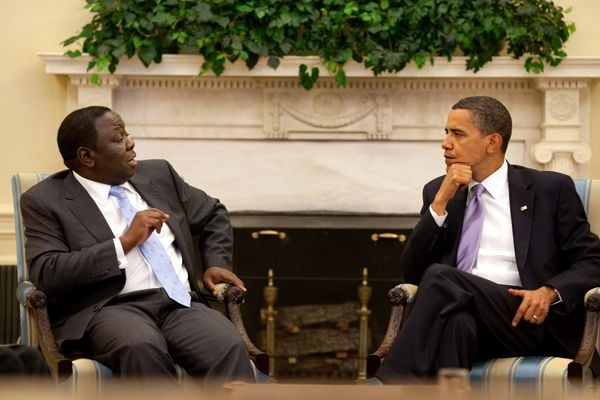
President Obama met with Zimbabwean Prime Minister Morgan Tsvangirai at the White House on June 12, 2009. White House photo.
Zimbabweans will go to the polls on Wednesday to participate in an election that will be closely monitored by hundreds of foreign observers, mostly from around Africa. One country that will be watching despite Western observer missions not being invited is the United States of America.
Relations between Washington and Harare are definitely nowhere near the “extraordinarily strong” level of the United States and South Africa, as recently described by South African president Jacob Zuma during U.S. President Barack Obama’s visit. And recent events and political statements certainly show it.
On 18 July, Zimbabwean President Robert Mugabe said the “insane” U.S. should not lecture Zimbabwe on its upcoming elections, and for it to keep its “pink nose” out of his country’s affairs.
“Your prisons are still full of blacks. Where is your democracy? There is lots of racism in your country,” Mugabe further stated.
His remarks come after Mugabe also recently attacked America’s stance on gay marriage, and criticized U.S. President Barack Obama for urging Africa to respect gay rights during his recent Africa visit.
Given the history between the two countries, this type of rhetoric is obviously expected. However, the issue of Zimbabwe’s upcoming elections is no joking matter.
The U.S. wants strong, peaceful elections and for all Zimbabweans to have a stake it their country’s future. Washington has been criticized because of their limited engagement, but contrary to popular belief, are helping Zimbabweans to fight some of the battles they face, albeit indirectly. For instance, Zimbabwe was granted $555 million in May by the Global Fund to Fight AIDS, TB and Malaria for the care and treatment of people living with HIV. This money will be used to support Anti-Retroviral Treatment for over one million Zimbabweans as well as more than 145 000 pregnant women between 2014 and 2016. The majority of this money comes from American sources. The U.S. government is the Global Fund’s largest contributor, contributing 1.65 billion dollars in 2013, but this excludes other massive donations from American NGOs and businesses like the Bill and Melinda Gates Foundation and Chevron.
More directly, observers from Africa and around the world including the U.S. will be on the ground this week to help ensure free and fair elections. America has worked with partners such as the University of South Africa (UNISA) to develop initiatives like the Democratic Elections in Africa Certificate Program for African election officials and other administrators with the goal of leading to more professional, independent, and effective electoral commissions in Zimbabwe and across Africa.
Contrary to many other analysts who feel these elections might just be a repeat of previous ones, I am hoping they are proved wrong.
In a recent letter to Mugabe, U.S. Secretary of State John Kerry offered to “revisit” current sanctions against Zimbabwe and the bilateral relationship if upcoming elections are transparent and peaceful. Washington continues to maintain sanctions on some 50 to 60 government officials and equally against some 50-60 Zimbabwean companies that are owned by those individuals or that are under the control of Zanu PF or the military.
In line with the “poor” bilateral relationship, the current trade status between the two countries is no different. Zimbabwe is not eligible under AGOA due to its governance, but there are trade agreements in place such as between the US and COMESA, which Harare is a part of, and the U.S. and Zimbabwe have a Trade and Investment Framework Agreement (TIFA). Regardless, the Foreign Trade office of the U.S. Census Bureau reports America’s goods exports to Zimbabwe from January to May 2013 only totaled $23 million. This number is actually colossal compared to the $4 million in Zimbabwean exports to the U.S. during the same time period.
U.S.-Zimbabwe relations simply cannot get any worse and now is the time to improve them.
Certain American businessman like real estate tycoon and Chicago fundraiser for Obama Elize Higginbottom have tried to promote U.S. business in Zimbabwe, but have come under strong criticism for “schmoozing” senior Zanu-PF figures, including Mugabe, in order to win lucrative business deals from the Zimbabwe government.
Nevertheless, the future of the relationship will ultimately be determined by what happens on Wednesday 31 July. The U.S. does not favor one or another political party, but wants the elections to get a clean bill of health by SADC and the AU.
The best-case scenario starts with credible, peaceful, and overall successful elections. This will allow the U.S. to start slowly suspending sanctions based on these results and the recent referendum passed on a new constitution.
Although the politics will still be tricky, this will ultimately open the door to an economic partnership that will positively impact industry in Zimbabwe and provide a broad range of opportunities for both American exports to Zimbabwe, but more importantly, more Zimbabwean exports and access to new markets in the U.S.
It will take a long time for U.S.-Zim trade figures to reach the current EU and Zimbabwe trade levels, around $800 million compared to $447 million in 2009, but to quote Lao Tzu: “A Journey of a thousand miles begins with one step.”